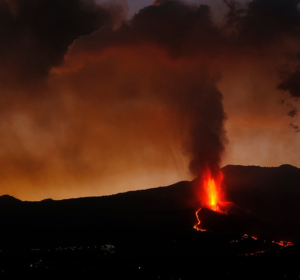Sugam Pokharel, Chris Liakos, Radina Gigova and Eve Brennan, CNN
A yellow-orange haze of dust from the Sahara desert has blanketed parts of Greece, creating spectacular scenes and prompting authorities to issue health warnings.
The Greek meteorological service said weather conditions on Tuesday had favored the movement of dust from Africa and this was showing up in “increased concentrations in the atmosphere,” particularly in the south of the country.
The dust is expected to gradually decrease on Wednesday morning, the service predicted, and from midday onwards it would be “limited to the east.”
Videos and images shared online showed people in Athens observing the yellow-orange fog from the hills near the Greek capital.
Others took evening walks in the city and shared the bright orange scenes on social media. Greek Meteorologist Kostas Lagouvardos posted on Facebook that Athens looked like “a colony of Mars.”
Clouds of dust moving from northern Africa to Greece and other regions is a phenomenon that occurs occasionally, bringing limited visibility and prompting warnings of breathing risks.
The eastern Mediterranean country of Cyprus has also been affected by the dust.
A low-pressure system over northern Africa swept dust over Cyprus several times in mid-April, “darkening skies and reducing air quality,” NASA said Tuesday.
An image from NASA’s Terra satellite showed “a shroud of tan” over Cyprus on April 22. Dust was expected to continue to cross the Mediterranean, impacting both Cyprus and Greece over the next several days, NASA said.
‘Freak’ weather hits Finland
As parts of Greece turned orange, Finland has been dealing with an unusually white April week. Heavier-than-usual snow in the north of the continent brought public transport to a standstill across soutern Finland, public broadcaster YLE reported.
“Freak April weather” brought more than 20 centimeters (7.9 inches) of snow to some areas, stranding trams and delaying bus and metro services in the Finnish capital and causing flight cancellations and delays at Helsinki Airport, YLE reported Tuesday.
M eanwhile, police in the southwest of the country reported around a dozen road traffic accidents — although no serious injuries — and maintenance workers struggled to clear the snow from power lines.
While snowfall is not uncommon in Finland’s winter months, a press officer for Helsinki’s public transport operator HSL, Johannes Laitila, told YLE such weather was “unusual” for late April and urged travelers to allow more time for journeys.
Photos showed Helsinki residents walking through thick snow and ice, carrying umbrellas under heavy snowfall, and tall clusters of snow piled up on sidewalks, cars and scooters.
Finland’s airport operator Finavia said that overnight freezing rain “which turns to ice almost immediately when it hits the ground” had fallen at Helsinki Airport.
“As a result, runway de-icing and aircraft wing de-icing must be done much more than usual for the time of year,” Finavia added.




